Infinite Family’s Monitoring & Evaluation Systems all Increase Teen Skills and Strengths
South Africa’s black teens will travel unchartered territory their whole lives, first in college or university then into jobs in the Fourth Industrial Revolution workforce – jobs no one in their family has ever held.
Our secret sauce is helping them learn how to successfully create their own secret sauce – how they will create opportunities for themselves – with the ingredients ‘everyone else’ already knows how to use.
Employers in all fields value employees who demonstrate characteristics like taking initiative, being dependable and punctual, communicating well, and showing commitment, among other quantifiable skills like showing upon time and ready and planning and organizing priorities so work deliverables arrive on time and well done.
Our Mentoring Model Builds Core Skills & Strengths
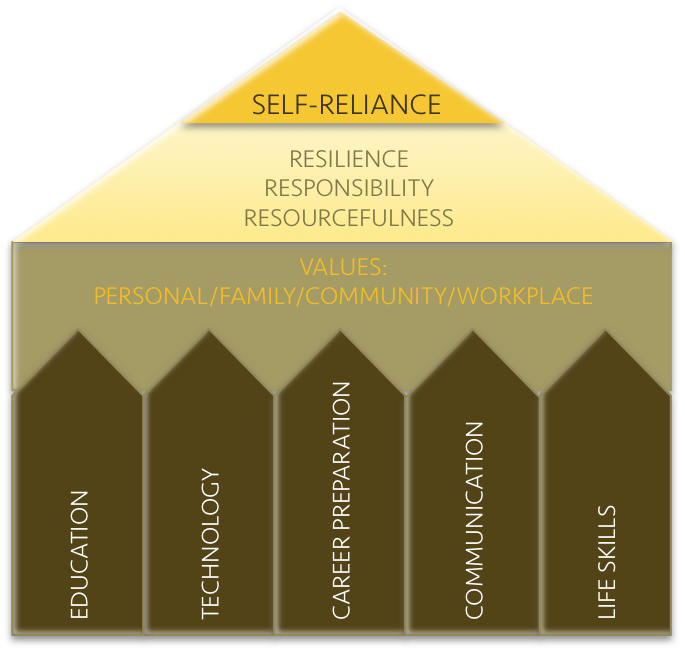
Infinite Family organizes all of the skills we want our Net Buddy mentees to learn into five core areas:
- Education
- Career Preparation
- Technology Literacy
- Communication
- Life Skills
In addition, South African teens who take the extraordinary leap across the technology, geographic, and cultural divides where the majority of them are growing up, and the 21st century workplace where they aspire to build better lives, requires immense personal resilience, resourcefulness, and responsibility to see them through.
Using these skills and strengths effectively requires testing and flexing them in different combinations, in a diversity of situations, day after day. Incremental improvements across a range of skills – e.g. researching, organization, editing, and speaking – eventually add up to being able to prepare and give the presentation that earns a promotion.
Letting our Net Buddy mentees be responsible for their success helps them build motivation, initiative, problem-solving and other critical success attributes along the way.
Our Monitoring & Evaluation System Does Triple Duty
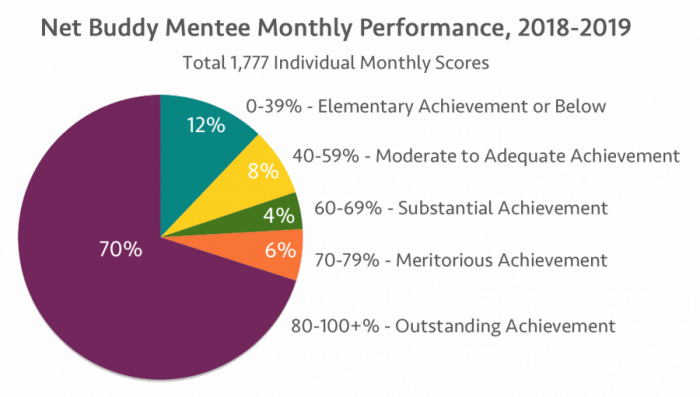
Net Buddy Performance Reports
The organizing feature of our monitoring and evaluation system is our monthly Net Buddy Performance Report, which reinforces the good habits, hard skills and the strengths and values that our Net Buddy mentees are developing with their Video Mentors in preparation for the 21st century workplace.
Each month, our Net Buddy mentees are expected to think ahead and perform a range of actions to develop skills that prepare them for success in secondary school, tertiary studies and the work world. We track the progress of our Net Buddy mentees’ expected tasks and goals such as writing weekly English blogs, attending video mentoring sessions, coming to the computer lab to do research and homework, and exhibiting respectful behavior – hard skills that translate to practical work place skills.
But our Net Buddy Performance Report goes even further in helping our Net Buddy mentees develop assets to help them get that critical first job.
Employers in all fields value employees who demonstrate characteristics like taking initiative, being dependable and punctual, communicating well, and showing commitment, among other skills.
Above all, they want to see a track record and have references from people who have already worked with potential young workforce candidates.
Our Net Buddy mentees can also demonstrate on their CVs and cover letters that they understand what is important to employers by describing their Infinite Family experience in similar metrics, for example:
- Exceeded my performance targets 19 months in my final two years;
- Attended 95% of scheduled video conversations on-time and prepared; or
- Led my computer lab in letters of community special recognition my last year of high school.
In addition to tracking our Net Buddies progress in preparing for their lives as self-reliant adults, Infinite Family’s Net Buddy Performance Report allows our staff to maintain a solid track record on file ready to be a good reference for our Net Buddy mentees when they seek those critical early part-time or full-time positions.
The weekly mentorship contact points, via video conversation and email, throughout our Net Buddy mentees’ turbulent years, consistent reinforcement of messages that focus on their futures, and thorough program produces young adults who have the ability to successfully manage the toxic stress that surrounds them on a daily basis.
Over time, they learn to be punctual, think ahead, have a proven track record, can produce written deliverables on a deadline, and maintain a professional, respectful attitude – making Infinite Family Net Buddy mentees ready to succeed at tertiary and in the modern work place.
By choosing to work extra hard and invest in themselves during their teen years, they are preparing for and creating the opportunities they want and deserve.
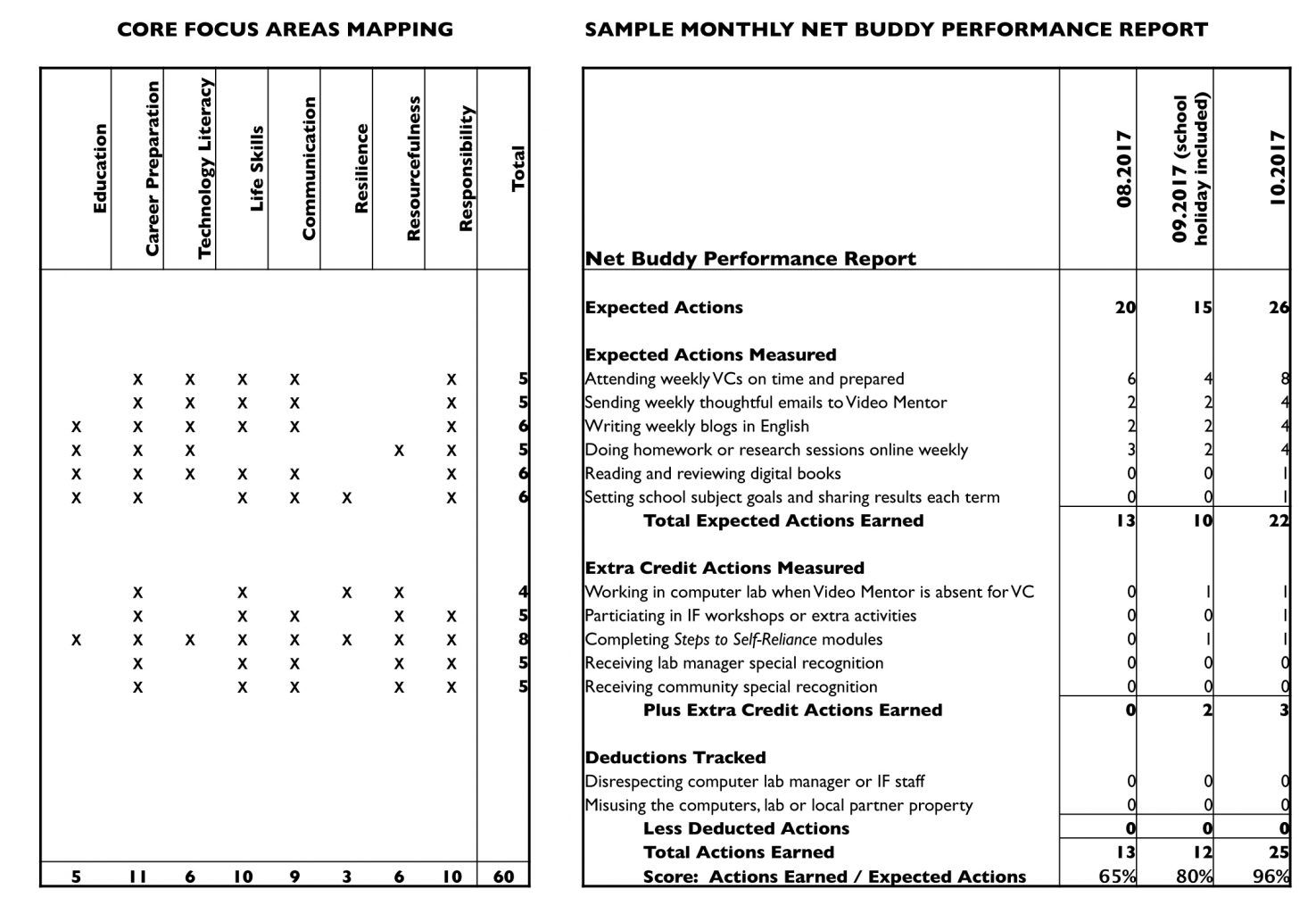
Skills in each core area and overall strengths of resilience, resourcefulness, and responsibility are reinforced in the weekly expected actions tracked by the Monthly Net Buddy Performance Report multiple times each for total reinforcement mapping.
School Grades by Class and Quarter
We also use school reporting to develop future forward thinking and acting.
As part of the Net Buddy Performance Reporting system, mentees are expected to share and discuss their grades with their Video Mentors every marking period.
Many of our Net Buddies do not have adults in their lives who believe in or reinforce the value of education. Video Mentors provide this reference point. By paying attention to their Net Buddies’s grades, Video Mentors model how important school is for their futures. With their mentors investing in their education, our Net Buddies soon begin to do so as well.
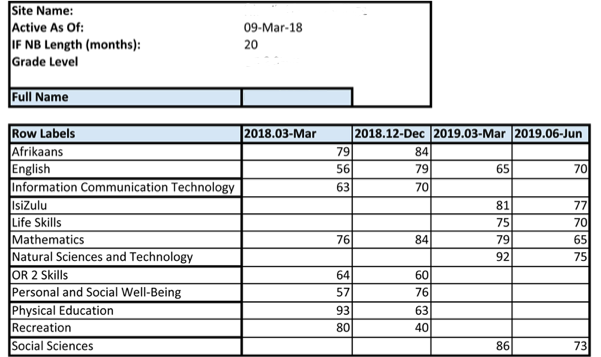
Furthermore, the very action of setting goals for the next period, reviewing the results, and then discussing what can be done to achieve goals that were not achieved, helps our Net Buddies learn how to take control and work toward things they wish to achieve. By practicing this over and over in high school, life long lessons and skills become second nature.
Why Don’t We Use Surveys?
Measuring the ultimate impact of video mentoring is a long-term proposition.
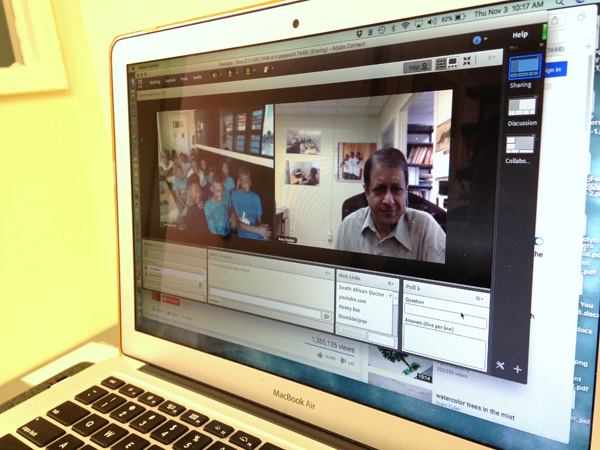
The basic question of whether individual video mentored teens build better lives because of our intervention is something we won’t know, for sure, for many years. No one – especially teens in the most turbulent period of their lives – knows today what decisions or actions they will choose when unpredicted forces are influencing them on their journey ahead.
No matter how good the survey tool is, asking teens now how they feel about their readiness to build a better future does not guarantee they will do so. Furthermore, it turns out that all of us are unreliable as self-administered survey candidates, even when we are anonymous.
Self-Administered Survey Bias Problem
Prior to 2017, we used a proprietary surveying system we called ImpacTracker.
After following best practices for five years in the design and implementation of this monitoring and evaluation tool, we concluded, as experts across the impact assessment industry were also beginning to acknowledge, that it is simply impossible to eliminate subject bias from impact data gathered via self-evaluation survey.
Monitoring and evaluation without trust in the process and results is not defensible, nor is it ethical to present to potential funders. We also believe it is not worth ongoing investment of time and resources.
How Survey Bias Affected ImpacTracker
The deprivation and complexity in our teens’ lives affected subject bias in ways that invalidated the data we were trying to collect, starting with the pre-service assessments.
For example, even our 11- and 12-year old mentee candidates consistently reported weekly computer use for Internet-based job hunting and other technology-based activities though most had never touched a computer before.
To these children, the risk of losing the opportunity to be connected with a Video Mentor was so great that – no matter how much we reassured them – they responded with the answers they believed we wanted to hear rather than those that they would later admit were true.
Other Challenges
In addition to returning unreliable data, the format of annual surveys did not help us serve teens because this process was:
- Intermittent and took too long to help us quickly or regularly innovate or improve our services;
- Took valuable time away from program services rather than aligned our staff, volunteer and teen activities;
- Reduced critical touchpoints and teachable moments with our teens; and ultimately
- Expended scarce resources without benefit to our teens or stakeholders.